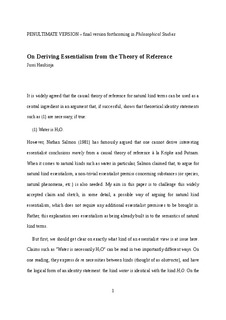| dc.contributor.author | Haukioja, Jussi | |
| dc.date.accessioned | 2014-10-22T09:12:19Z | |
| dc.date.accessioned | 2016-06-17T11:48:17Z | |
| dc.date.available | 2014-10-22T09:12:19Z | |
| dc.date.available | 2016-06-17T11:48:17Z | |
| dc.date.issued | 2014-08 | |
| dc.identifier.citation | Philosophical Studies 2014 | nb_NO |
| dc.identifier.issn | 0031-8116 | |
| dc.identifier.uri | http://hdl.handle.net/11250/2393062 | |
| dc.description.abstract | Causal theories of reference for natural kind terms are widely agreed to play a central role in arguments for the claim that theoretical identity statements such as “Water is H2O” are necessary, if true. However, there is also fairly wide-spread agreement, due to the arguments of Nathan Salmon (in Reference and Essence), that causal theories of reference do not alone establish such essentialism about natural kinds: an independent, non-trivial essentialist premise is also needed. In this paper I will question this latter agreement. I will argue that there is an independently attractive explanation of why such identity statements are metaphysically necessary, if true: an explanation which relies on assumptions about the semantics of natural kind terms, general philosophical assumptions about reference, and straightforward empirical assumptions, but presupposes no non-trivial essentialist premises. | nb_NO |
| dc.language.iso | eng | nb_NO |
| dc.publisher | Springer Verlag | nb_NO |
| dc.title | On Deriving Essentialism from the Theory of Reference | nb_NO |
| dc.type | Journal article | nb_NO |
| dc.type | Peer reviewed | nb_NO |
| dc.date.updated | 2014-10-22T09:12:20Z | |
| dc.source.pagenumber | 2141–2151 | nb_NO |
| dc.source.volume | 172 | nb_NO |
| dc.source.journal | Philosophical Studies | nb_NO |
| dc.source.issue | 8 | nb_NO |
| dc.identifier.doi | 10.1007/s11098-014-0402-0 | |
| dc.identifier.cristin | 1165936 | |
| dc.relation.project | Norges forskningsråd: 212841 | nb_NO |
| dc.description.localcode | © Springer Verlag. This is the authors’ accepted and refereed manuscript to the article. | nb_NO |
